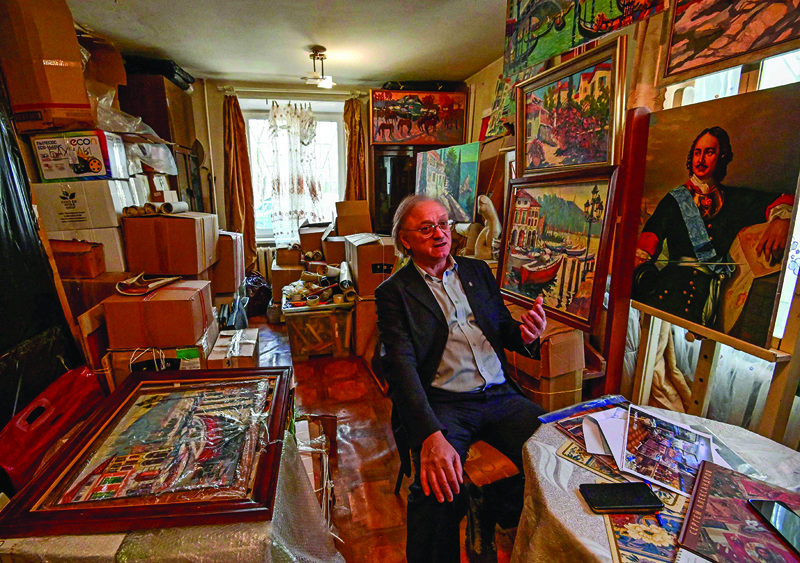 This photo shows painter Sergei Alexandrov speaking during an interview with AFP at his workshop.-AFP
This photo shows painter Sergei Alexandrov speaking during an interview with AFP at his workshop.-AFPSergei Alexandrov has just a few weeks to take down the colorful landscapes and seaside sunsets that have brightened the walls of his Moscow studio ahead of a deadline to demolish it. The Soviet-era residence block near the center of the Russian capital which houses his workplace is set to be leveled as part of a massive urban renewal drive that will see thousands of apartment buildings replaced with towering skyscrapers.
The packing boxes on the floor of the studio that he rents for a pittance are filling up quickly, but Alexandrov has no idea where to take them. "They haven't made me an offer yet, so I'm going to stay until the end," Alexandrov told AFP with a smile, looking out at removal vans hauling off the belongings of the bloc's last remaining residents. The 65-year-old is one of hundreds of artists in Moscow at risk of losing their studios under the ambitious urban project, which is costing authorities some 100 billion rubles per year ($1.2 billion).
Over 4,000 buildings are ultimately expected to be leveled and some 350,000 households relocated, but the future looks dim for the artists. Until now they benefited from a Soviet-era program that provided free studios to members of the Moscow Artists Union who only had to foot the bills. The workspaces are mostly located in Khrushchyovkas, low-cost housing units thrown up in the 1960s and nicknamed after the Soviet leader Nikita Khrushchev who commissioned them.
Now, after years of neglect, many of the hastily constructed five-storey buildings across Moscow are up for demolition-and with them the artist studios. President of the Moscow Artists Union Viktor Glukhov told AFP that officials have not offered any solution and that the demolitions mean many artists have "nowhere to go". Since the Union lacks financial capacity to fill the gap, at least 200 artists risk "losing everything," Glukhov said. However, other artists told AFP that the real number could closer to 1,000 with members of another union also facing evictions.
'Moscow is losing its soul'
Alexandrov, who has made a relatively successful career, acknowledged that his predicament could be worse. One of his paintings hangs in the Russia's embassy in Washington and he claimed to have the ear of an adviser to President Vladimir Putin, who "wanted to help me". "But there are hundreds of others apart from me," he said.
For many artists the subsidized studios are an important lifeline when other means of support are practically non-existent. In another residence block in Izmaylovo, where Alexandrov keeps his studio, Polina Surovova is one of the last occupants of a Khrushchyovka where residents received eviction notices in August last year. The studios are mostly located on the top floor of the Soviet-designed buildings where 14 studios line a single corridor with a shared a kitchen and shower.
The workspaces are each around 50 square meters, with high ceilings and light flooding in through large windows making the rooms ideal for visual artists. "If I had to rent a room, it would costs tens or hundreds of times more," said 28-year-old Surovova. "Of course I wouldn't be able to afford it." Moscow's mayor Sergei Sobyanin has sought to assure worried Muscovites that nobody "will be left on the street". His office however did not respond to AFP's request for comment on the studio space. The sweeping renovations of Moscow that began 10 years ago has brought with it new parks, pedestrian-friendly streets and modern public transport that have overhauled the Russian capital.
But some fear that Moscow will lose an important part of its character with this blunt modernization drive. Despite some protests, the demolition of the Khrushchyovkas was mostly welcomed by residents of the capital. But some Muscovites told AFP they were concerned by the towering residence buildings expected to be erected in their place of the Soviet residence blocks. "Moscow is losing its soul, its essence," said Yelena Yanchuk, an opposition municipal deputy from Izmaylovo who has spoken out for the artists in the neighborhood. She blamed the changes on the "cold, commercial business-approach" of the city authorities. "If this continues, Moscow's future looks very poor." - AFP








